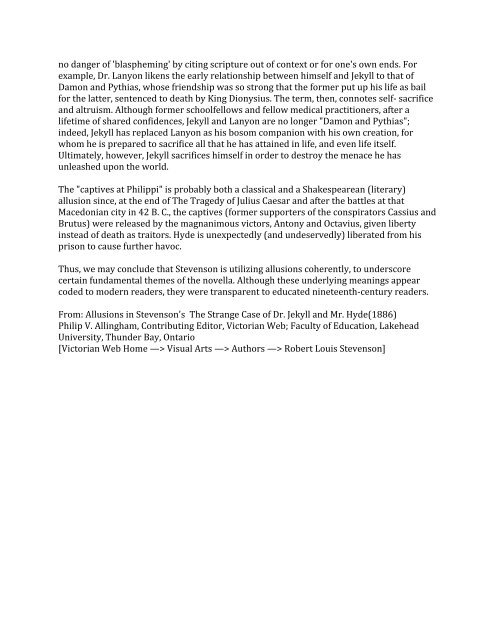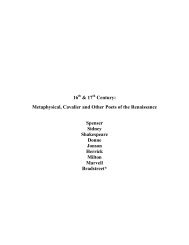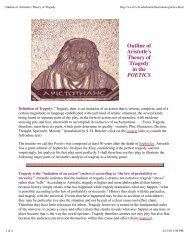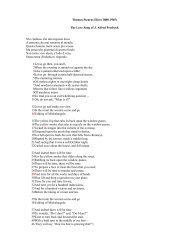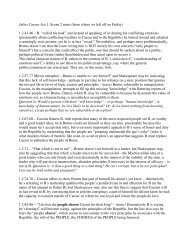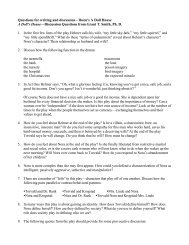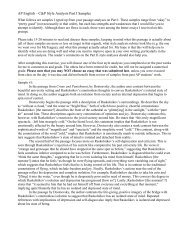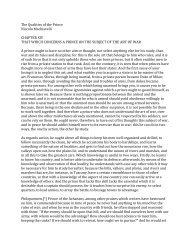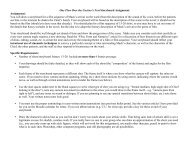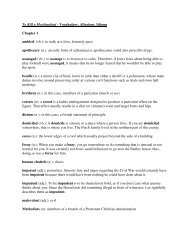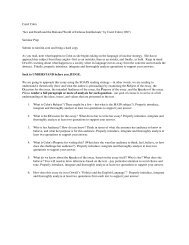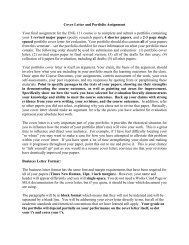An ALLUSION in a literary text is a reference, either explicit or ...
An ALLUSION in a literary text is a reference, either explicit or ...
An ALLUSION in a literary text is a reference, either explicit or ...
Create successful ePaper yourself
Turn your PDF publications into a flip-book with our unique Google optimized e-Paper software.
no danger of 'blasphem<strong>in</strong>g' by cit<strong>in</strong>g scripture out of con<strong>text</strong> <strong>or</strong> f<strong>or</strong> one's own ends. F<strong>or</strong><br />
example, Dr. Lanyon likens the early relationship between himself and Jekyll to that of<br />
Damon and Pythias, whose friendship was so strong that the f<strong>or</strong>mer put up h<strong>is</strong> life as bail<br />
f<strong>or</strong> the latter, sentenced to death by K<strong>in</strong>g Dionysius. The term, then, connotes self‐ sacrifice<br />
and altru<strong>is</strong>m. Although f<strong>or</strong>mer schoolfellows and fellow medical practitioners, after a<br />
lifetime of shared confidences, Jekyll and Lanyon are no longer "Damon and Pythias";<br />
<strong>in</strong>deed, Jekyll has replaced Lanyon as h<strong>is</strong> bosom companion with h<strong>is</strong> own creation, f<strong>or</strong><br />
whom he <strong>is</strong> prepared to sacrifice all that he has atta<strong>in</strong>ed <strong>in</strong> life, and even life itself.<br />
Ultimately, however, Jekyll sacrifices himself <strong>in</strong> <strong>or</strong>der to destroy the menace he has<br />
unleashed upon the w<strong>or</strong>ld.<br />
The "captives at Philippi" <strong>is</strong> probably both a classical and a Shakespearean (<strong>literary</strong>)<br />
allusion s<strong>in</strong>ce, at the end of The Tragedy of Julius Caesar and after the battles at that<br />
Macedonian city <strong>in</strong> 42 B. C., the captives (f<strong>or</strong>mer supp<strong>or</strong>ters of the conspirat<strong>or</strong>s Cassius and<br />
Brutus) were released by the magnanimous vict<strong>or</strong>s, <strong>An</strong>tony and Octavius, given liberty<br />
<strong>in</strong>stead of death as trait<strong>or</strong>s. Hyde <strong>is</strong> unexpectedly (and undeservedly) liberated from h<strong>is</strong><br />
pr<strong>is</strong>on to cause further havoc.<br />
Thus, we may conclude that Stevenson <strong>is</strong> utiliz<strong>in</strong>g allusions coherently, to undersc<strong>or</strong>e<br />
certa<strong>in</strong> fundamental themes of the novella. Although these underly<strong>in</strong>g mean<strong>in</strong>gs appear<br />
coded to modern readers, they were transparent to educated n<strong>in</strong>eteenth‐century readers.<br />
From: Allusions <strong>in</strong> Stevenson's The Strange Case of Dr. Jekyll and Mr. Hyde(1886)<br />
Philip V. All<strong>in</strong>gham, Contribut<strong>in</strong>g Edit<strong>or</strong>, Vict<strong>or</strong>ian Web; Faculty of Education, Lakehead<br />
University, Thunder Bay, Ontario<br />
[Vict<strong>or</strong>ian Web Home —> V<strong>is</strong>ual Arts —> Auth<strong>or</strong>s —> Robert Lou<strong>is</strong> Stevenson]


